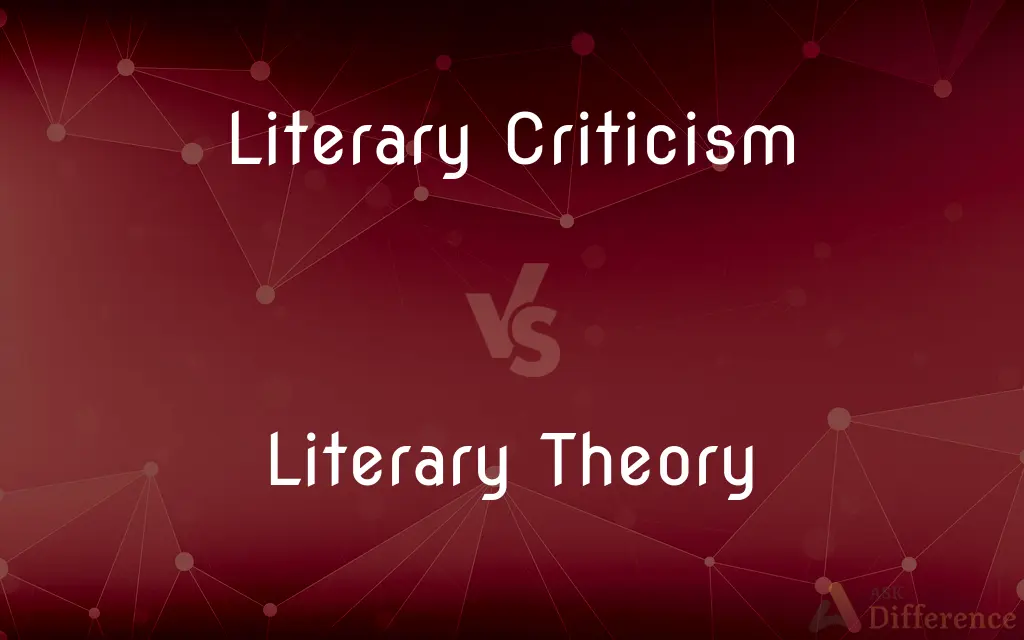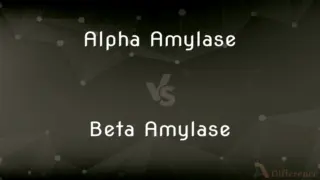Literary Criticism vs. Literary Theory — What's the Difference?
Edited by Tayyaba Rehman — By Fiza Rafique — Published on December 1, 2023
Literary Criticism evaluates specific literary works, while Literary Theory provides frameworks for understanding literature's broader aspects. Both delve into the study of literature but focus on different aspects.

Difference Between Literary Criticism and Literary Theory
Table of Contents
ADVERTISEMENT
Key Differences
Literary Criticism primarily revolves around the evaluation, analysis, and interpretation of individual literary works. It involves a detailed study of a particular text, dissecting its elements like plot, characters, and style. On the other hand, Literary Theory delves into the overarching methods, principles, and ideologies that form the foundation for such analysis.
Literary Criticism often requires the critic to engage deeply with a text, offering insights, highlighting strengths or weaknesses, and providing context. This might involve evaluating a novel's themes, character development, or narrative techniques. Literary Theory, in contrast, is less about specific texts and more about the broader methodologies and ideological lenses through which literature can be viewed and interpreted.
In the academic world, Literary Criticism is often a product of Literary Theory. Critics apply various theoretical frameworks to dissect and comment on texts. These frameworks, grounded in Literary Theory, offer diverse lenses — from feminism to post-colonialism — which shape the critique.
While Literary Criticism is the practical application of evaluating specific texts, Literary Theory provides the tools and frameworks for this evaluation. For instance, a critic might use the tenets of Marxist Literary Theory to analyze class conflict in a novel. In this scenario, the theory provides the foundation, and the criticism is the outcome.
Comparison Chart
Primary Focus
Evaluation of specific literary works.
Frameworks for understanding literature broadly.
ADVERTISEMENT
Application
Applied to individual texts.
Applied to broad concepts and methodologies.
Outcome
Insights, evaluations, and interpretations of a text.
Ideologies and methods for analyzing literature.
Dependency
Often depends on literary theories for analysis.
Independent, provides basis for criticism.
Academic Representation
Practical application and text-specific analysis.
Theoretical discussions and development of frameworks.
Compare with Definitions
Literary Criticism
The evaluation and interpretation of a literary work.
Her literary criticism of Moby Dick offered a fresh perspective on the novel's themes.
Literary Theory
A discipline exploring the nature and goals of literature.
Deconstructionist literary theory challenges traditional interpretations by highlighting ambiguities.
Literary Criticism
An exploration of a text's themes, style, and structure.
Through literary criticism, she unveiled the hidden motifs in the poem.
Literary Theory
A set of ideas and methods used to analyze literature.
Feminist literary theory examines texts through the lens of gender dynamics.
Literary Criticism
Commentary on the techniques and messages within literature.
Literary criticism often sheds light on a writer's intentions and societal reflections.
Literary Theory
The study of the principles behind literary analysis.
Structuralist literary theory delves into the underlying structures of narratives.
Literary Criticism
The act of assessing the merits and faults of a piece of writing.
His literary criticism highlighted the novel's inconsistent character development.
Literary Theory
A framework for understanding the broader aspects of literature.
Post-colonial literary theory focuses on works produced in post-colonial societies.
Literary Criticism
A detailed study and analysis of literature.
Literary criticism can provide readers with deeper insights into a text's nuances.
Literary Theory
The ideologies that inform how literature is read and interpreted.
Through Marxist literary theory, one might study literature's portrayal of class struggles.
Common Curiosities
Is Literary Theory always objective?
No, Literary Theory can be influenced by cultural, societal, and personal beliefs.
Can Literary Criticism exist without Literary Theory?
While it can, Literary Criticism often utilizes theories as lenses for analysis.
Why is Literary Criticism important?
Literary Criticism offers deeper insights into texts, enriching readers' understanding and appreciation.
How is Literary Theory different from Literary Criticism?
Literary Theory provides broad frameworks for understanding literature, while Literary Criticism applies these frameworks to specific texts.
What is the primary focus of Literary Criticism?
Literary Criticism focuses on evaluating and interpreting specific literary works.
Why is Literary Theory important in academia?
Literary Theory offers scholars methodologies and perspectives to analyze and understand literature in broader contexts.
How can one choose a Literary Theory for analysis?
It depends on the text's content and the themes or perspectives the critic wishes to explore.
Does Literary Theory evolve over time?
Yes, as societies and cultures change, new theories can emerge, and existing ones can evolve.
Can Literary Criticism influence an author's subsequent works?
Yes, authors might take criticisms into account in their future writings.
How do Literary Criticism and Literary Theory influence literary studies?
They shape how literature is taught, studied, and understood, promoting deeper engagement and diverse perspectives.
Are there multiple types of Literary Theory?
Yes, there are various theories, including feminist, Marxist, post-colonial, and more.
Can a piece of literature have multiple valid criticisms?
Absolutely. Literary Criticism can vary based on the critic's perspective and chosen theoretical framework.
Is Literary Criticism always negative?
No, criticism can be positive, negative, or neutral, focusing on understanding and interpreting the text.
Can a single text be analyzed using multiple literary theories?
Yes, a text can be viewed through multiple theoretical lenses, yielding varied interpretations.
Are all literary theories universally accepted?
No, some theories might be debated or rejected by certain scholars or cultures.
Share Your Discovery

Previous Comparison
Java vs. Core Java
Next Comparison
Alpha Amylase vs. Beta AmylaseAuthor Spotlight
Written by
Fiza RafiqueFiza Rafique is a skilled content writer at AskDifference.com, where she meticulously refines and enhances written pieces. Drawing from her vast editorial expertise, Fiza ensures clarity, accuracy, and precision in every article. Passionate about language, she continually seeks to elevate the quality of content for readers worldwide.
Edited by
Tayyaba RehmanTayyaba Rehman is a distinguished writer, currently serving as a primary contributor to askdifference.com. As a researcher in semantics and etymology, Tayyaba's passion for the complexity of languages and their distinctions has found a perfect home on the platform. Tayyaba delves into the intricacies of language, distinguishing between commonly confused words and phrases, thereby providing clarity for readers worldwide.













































